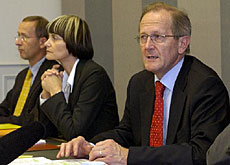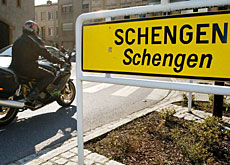Government hands bilateral accords to parliament

The Swiss government has submitted a series of bilateral accords with the European Union to parliament for approval.
The package of treaties is expected to be voted on in December, but it is likely that the electorate will have the final say in a nationwide vote next year.
The Swiss president, Joseph Deiss, said the new set of accords with Brussels was the only way for the country to avoid isolation in Europe.
Non-EU member Switzerland agreed to the accords with Brussels in May after two years of tough negotiations, which became bogged down over disagreements on the taxation of EU residents’ savings income in Swiss banks and on the issue of banking secrecy.
The most controversial of the nine treaties is the Schengen/Dublin accord governing closer cooperation on security and asylum.
But Foreign Minister Micheline Calmy-Rey said the accords were acceptable to both pro- and anti-Europeans, and added that Swiss business, finance and tourism sectors would benefit from their implementation.
She also downplayed fears that the country’s internal security would be compromised by the extension of ties with Brussels and said that it was in Switzerland’s interest to cooperate more closely with its biggest trading partner.
Separate accords
The accords are due to be formally signed later this month.
Parliament is being asked to consider each of the treaties separately, rather than as a whole package.
At a press conference on Friday, Deiss and Calmy-Rey said that the seven-member Swiss cabinet was ready to defend the accords in parliament.
Justice Minister Christoph Blocher, a member of the rightwing Swiss People’s Party, has made no secret of his distrust of closer ties with Europe.
But he said he would campaign in favour of Schengen/Dublin, even though his own party is threatening to force a nationwide vote on the accord.
Some politicians on the Left had called on Blocher to withdraw from the campaign.
Support and opposition
Three of the four parties in government – the centre-right Radicals and Christian Democrats and the centre-left Social Democrats – have come out in favour of the bilaterals, as have the country’s main business associations and the cantons.
Opposition to the accords – specifically Schengen/Dublin – is being spearheaded by the People’s Party, together with organisations such as the Campaign for an Independent and Neutral Switzerland (CINS).
CINS says the implementation of Schengen/Dublin will lead to an increase in crime and insecurity in Switzerland.
Besides Schengen/Dublin, parliament will also have to ratify seven other bilateral treaties on the taxation of savings, the fight against customs fraud, processed agricultural products, the environment, statistics, the EU’s media programme and pension schemes.
A ninth bilateral accord on education and Swiss participation in European training programmes does not require parliamentary approval.
A first set of bilateral treaties between Switzerland and the EU, mainly on trade, labour and transport issues, came into force in 2002.
swissinfo with agencies
The second set of bilateral accords between Switzerland and the European Union should be signed on October 25.
The House of Representatives and the Senate will discuss the accords during their December session.
Opponents will then have 100 days to collect enough signatures to force a nationwide vote.
A vote on the Schengen/Dublin accord would take place next June at the earliest.

In compliance with the JTI standards
More: SWI swissinfo.ch certified by the Journalism Trust Initiative











You can find an overview of ongoing debates with our journalists here . Please join us!
If you want to start a conversation about a topic raised in this article or want to report factual errors, email us at english@swissinfo.ch.